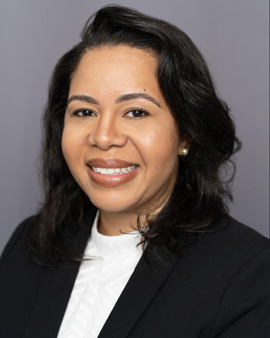
Roshell Muir, PhD, is a research assistant professor in Drexel’s Department of Family Community and Preventive Medicine. She is also the director of the Office of Urban Health, Equity, Education and Research (UHEER), dedicated to bridging the gap between health care education and research at the College of Medicine.
Dr. Muir's education spanned diverse locations: undergraduate studies in experimental biology in Jamaica; a master's degree in virology in London; and a PhD in medicine with a concentration in respiratory immunology in Northern Ireland. Post-PhD, she completed a one-year postdoc in human immunology at the Vaccine and Gene Therapy Institute in Florida before the lab moved to Drexel. Following three years, she advanced to research associate, then senior research associate, before securing a faculty appointment.
Her postdoc journey was driven by a passion for advancing immunology research, specifically in infectious diseases like HIV. She sought to contribute to the progress of HIV cure and vaccine efforts while refining her skills in diverse immunological techniques and leading collaborative projects, in alignment with her chosen lab's focus.
During Dr. Muir's postdoc and research associate roles, she actively participated in scientific organizations, including the American Association of Immunologists, American Society for Microbiology, and the American Association for the Advancement of Science. She co-founded the Drexel Postdoctoral Association under Dr. Natalie Chernets' leadership, serving on its Executive Board with fellow women postdocs. Dr. Muir represented as a Research Associate on the College of Medicine Women in Medicine and Science Committee, contributing to initiatives for women's professional development. She played a key role in organizing the Women’s Leadership Summit, addressing gender equity in medicine and science. Currently, as president of the Philadelphia Chapter for the Association for Women in Science, she continues to dedicate herself to fostering the next generation of scientists.
What is your favorite part of being a faculty member?
What I like about my job is that no day is the same and I get to interact with so many people across the university including senior leaders, other faculty, professional and administrative staff, and graduate and medical students. I also meet regularly with outside collaborators and liaise with vendors from many industries who are integral to some of the services and machines we use, and all these relationships are an important part of carrying out my job efficiently, but also it makes it enjoyable.
How does your postdoc experience translate to your current career?
During my postdoc I was able to develop my skills not only in research and to become an expert in flow cytometry and sorting and I am regularly asked to consult on multiple flow/sorting-related projects. The diversity of the projects I worked on allowed me to work with diverse teams, get the chance to lead projects, and liaise with multiple stakeholders including program managers, vendors, and researchers at all levels of their career. These experiences set me up for my current role to manage the UHEER office dedicated to driving thought process and education around health equity in our medical school and for our community. I enjoy leading teams and driving strategy and I am hoping to continue in academic medicine and university leadership where I can bring all my experience as a postdoc and investigator to a more senior space to inform strategies that not only align with the university, but also with the people that are the drivers of innovation- our students and postdocs.
What advice would you give to someone (i.e. a graduate student) that is considering your current path as a faculty member?
A. Research Your Career Path: My advice would be to do your research on the kind of work you see yourself doing for the next few years and if this postdoc will help you get there.
B. Importance of Considerations: Consider factors such as the area of research, the skills you'll acquire, your prospective supervisor, and the skills you hope to develop. These are the most important considerations because it is easy to get lost in a system that isn’t necessarily structured around advancing your career but more so your education. However, it can provide valuable tools if you have a well-thought-out plan to reach your goals.
C. Detailed Job Description for Tenure Track: They may have specific requirements, so it's crucial to obtain a detailed job description early on to understand what they are looking for in a tenure track position within your field.
D. Focus on Postdoctoral Role: Think about the postdoctoral role you are aiming for. Also, I recommend exploring other options for faculty roles, even without doing a postdoc, such as the Faculty First Program at the Dornsife School of Public Health at Drexel which is a structured program and ensures you have several mentors to help you succeed in your first few years.
E. Consider Industry Postdocs: Some graduate students I have advised have gone on to do industry postdocs, which are more structured programs in large pharmaceutical companies. This is another consideration for someone thinking of developing and learning in both worlds.
If you weren’t a postdoc alumni/current faculty, what else would you see yourself doing?
I would definitely be working in project management in a different industry. I have gained extensive project management experience during my postdoc. I was fortunate to be in a lab where the PI allowed me to lead and manage my part of the project, including writing project management reports. I also had prior project management experience working in finance after finishing my undergraduate degree, and later working in pharma after completing my master's.
Do you have a recommendation on any facilities or “best-kept secret” in Drexel?
The Bean Bag Cafe, located on the ground floor of the new college building at 15th and Race. It's my go-to-spot for coffee and sandwiches every morning! The owner, who is truly amazing, used to own the cafe in Hahnemann Hospital.